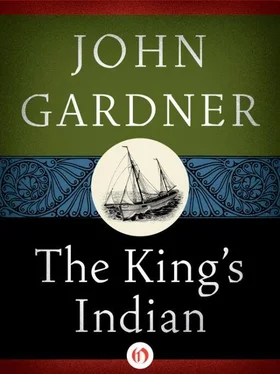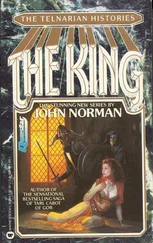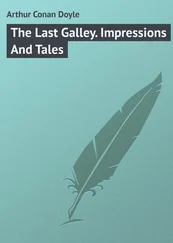“All in good time,” he said, and showed his teeth. The excitement in his voice was not comforting, nor was her shriek from a distant room, assuring us that she’d found a cloth. Mad as March hares, the both of them, I thought. I must step wary.
Now the woman had returned with the cloth and was dabbing at my knees and slippers, laboring quickly and shyly, her face tipped to one side, like an often whipped dog, or like one of those wasting saints in old, old paintings. I watched her narrowly. But that moment a great jolt shook the whole house, and I remembered — amazed that I’d forgotten — what I’d come for.
“Good heavens!” I said, “we must all hurry down to the storm cellar!”
They looked at one another in what I’d swear was panic, then immediately smiled, disingenuous as thieves. “Impossible!” they both said at once. The doctor leaned forward and, splashing out his arms as if trying to communicate in a foreign language, said: “Out of the question! The storm cellar’s flooded!” “Flooded!” she squealed, a split second after him. They laughed, hard and sharp, as if at some ghastly gallows joke.
“Flooded?” I said. I studied first one, then the other. “I see.” You may imagine that you, in my place, would have insisted. But I assure you, one can never be too careful with these people.
Now the woman had poured me more hot spiced wine. It seemed to me unnaturally dark and thick. On reflection I determined to leave it untouched, though without appearing to do so.
“But rest assured, Doctor,” she was saying as she poured. “Our house is completely invulnerable.”
I thought of the tower I’d seen teetering in the wind, and sweat popped out on my forehead. It seemed to me now that I could hear it creaking, rocking the whole house from side to side. The woman poured wine for my host.
And now once more the pale man hurled himself forward from his chair, his white hand flashing toward me like a knife. “Forgive me! I’ve failed to introduce myself! I’m Professor John Hunter.”
I no doubt showed my surprise and, immediately afterward, my horror. “John Hunter the geneticist?” I asked, too casual.
“The same!” he said.
And so now I knew beyond a shadow of a doubt that he was dangerously mad — as mad as the true Professor Hunter, dead these thirty years and entombed with his victims. “I’m glad to meet you, sir,” I said. “And I am—” I examined his face, decided to be cautious. “Dr. William Thorpe.” We shook hands. He looked at me, clinging like a monkey to my hand, clinging as if he would never let me loose, yet innocently smiling, and I knew — as surely doomed as a prisoner hearing the judge read his death sentence — that “Professor Hunter” had been through my belongings and was apprised that William Thorpe was not my name.
6
Who knows what drove him to talk to me? The woman did not like it, but there was nothing she could do. He sat leaning forward, his face in darkness, his red hair lighted by the flickering lamp. He talked to me of Gnostics, Albigensians. I have only the vaguest idea what he said or why the poor demented devil should be, as obviously he was, so outraged by long-dead heresies. At times, too excited to remain in his seat, the professor would leap up to pace, head and shoulders thrown violently forward, his nostrils flaring, his enormous pale eyes rolling in his head like my Shakespeare’s.
All the world, he said, went stark, raving mad in the second century, when the Gnostics separated body and mind. And the bitter proof, perfect ikon of it all, was the twelfth-century Albigensians. His eyes grew paler and paler as he talked, or so it seemed to me, and the knuckles of his clenched fists went white, almost blue. To the Albigensians flesh was worthless and meaningless, he said. The inner circle, the old initiates, turned further and further from bodily delights, and eventually the chief of those wise old men starved themselves to death. Meanwhile, those of the outer circle, equally persuaded that flesh was irrelevant, gorged themselves and drank themselves blind — irrelevant— and organized orgies of fierce though unimportant copulation. So while the old men upstairs, in the inner sanctum, starved, indifferently abandoning life, the younger, downstairs, indifferently consumed it. Once the mind cuts reality in two, not all the king’s horses or horsemen can reassemble it. I said the opinion was interesting. What else could I say?
He spoke very softly — now and then throwing me a worried glance — of his work in the field of genetics. He pitched his gaze just higher than my head (standing pressed into the corner now, as if someone in the room had driven him there) and he spoke with unnatural gentleness, as if to renounce John Hunter’s history of laboratory murders — grave on grave of dead foetuses — or as if he had hope of appeasing the howl and shriek outside.
“But to men of true Imagination,” he said — and cast his eyes toward the shuddering ceiling—”to men of Feeling and Intellect, the truths of the Ancients need not be exhausted! Suppose you and I should deny God’s existence, crush the mad poets’ idea of Soul. Would we not have at last made life whole again?”
“Wholly bad, I venture.”
“Perhaps, perhaps! But then again, we might get a shock, don’t you think, Doctor? Suppose all goodness is immanent, buried in matter — in animal spirits, the humours, in cryptarch, inorganic atoms — buried there since Time began, where it labors to be born? Suppose knowledge is a thing that can be eaten, as cannibals imagine — West Indian savages, for instance, who consume the shamans of rival tribes. Suppose, in other words, that knowledge is actually, in some way we can’t understand, mere meat.”
The anguished wringing of the woman’s hands was dreadful to behold. My diagnosis was that the man’s revelation of his mind’s imbalance was profoundly unsettling to her sensitive soul. I’d have comforted the lady if possible. But I could hardly reach out and pat her arm to reveal my fellow-feeling. Hunter’s eyes, paranoiacally rolling, missed nothing.
“The hypothesis would not be very good for one, it seems to me,” I said. “As to its ultimate truth or falsity—”
“Heaven knows, not ‘good for one,’ not healthy, I agree!” He blanched, lips trembling, and clasped his hands together. “Yet what is the intellect for if not to penetrate, dissect? There’s your God, Dr. Thorpe! The human intellect! — God and Devil both! It creates and burns the crepuscular world with its own pale flame and leaves nothing in its wake.”
I fidgeted. He was actually catching me up in his lunatic paradoxes. Rather than reason with a raving madman, rather than play my mouse’s part in his mysterious game of cat and mouse, I would sit more heavily, arms pressed firmly to the arms of my chair, my spectacles rigid and low on my nose. I would cling to common sense as to an oak tree. “You say knowledge is meat. You would hardly call beefsteak crepuscular, a thing of twilight.”
He leaned forward, squinting. “Nothing exists, Dr. Thorpe. We’re dreams in the mind of a sleeping dragon. That’s our hope.”
“Thus I refute Bishop Berkeley!” I said, rather fiercely, and gave the chair arm a resounding thump.
He squealed with laughter, a noise indescribably terrible to my ears, as if the chair arm should suddenly have felt pain and should confusedly express it by a laugh. Then for a long time Hunter was silent, his frightened eyes riveted to me. The swaying oil lamp above us projected his shadow on the wall, a crouched, wild-headed animal. I received a strong impression that the poor man was trying to tell me something, flash me some warning or signal some desperate appeal. I glanced at the woman — small, dressed in white, like a virgin laid out for her funeral. Was it possible, I wondered, that she was the threat, and Hunter’s nonsense all aimed, in fact… Sickly as she was in all other respects, her bosom was large, like the bosom of a healthy young wet nurse.
Читать дальше











![John Bruce - The Lettsomian Lectures on Diseases and Disorders of the Heart and Arteries in Middle and Advanced Life [1900-1901]](/books/749387/john-bruce-the-lettsomian-lectures-on-diseases-and-disorders-of-the-heart-and-arteries-in-middle-and-advanced-life-1900-1901-thumb.webp)
